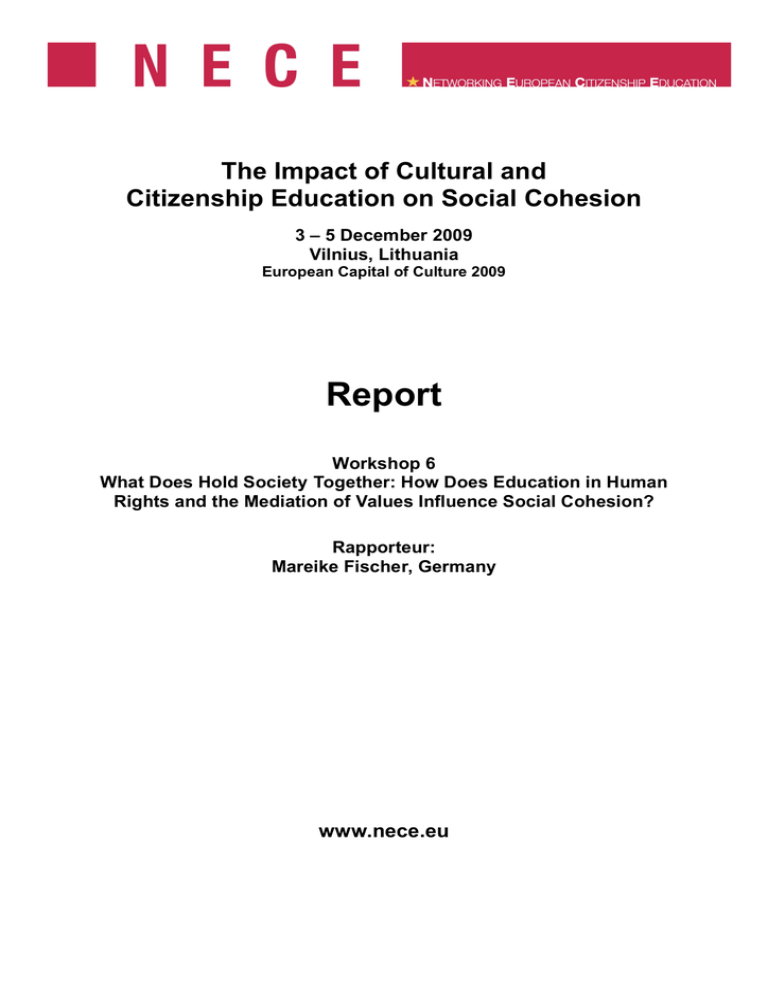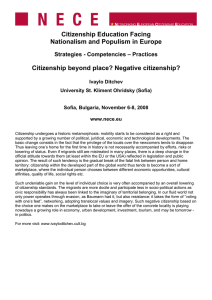Report The Impact of Cultural and Citizenship Education on Social Cohesion
advertisement

The Impact of Cultural and Citizenship Education on Social Cohesion 3 – 5 December 2009 Vilnius, Lithuania European Capital of Culture 2009 Report Workshop 6 What Does Hold Society Together: How Does Education in Human Rights and the Mediation of Values Influence Social Cohesion? Rapporteur: Mareike Fischer, Germany www.nece.eu What Does Hold Society Together: How Does Education in Human Rights and the Mediation of Values Influence Social Cohesion? Scientific Inputs: Georg Pirker, DARE – Network for Democracy and Human Rights Education in Europe (Germany) Maria Golubeva, Network of Education Policy Centres (NEPC)/PROVIDUS – Centre for Public Policy (Latvia) Project Presentations: Vilana Pilinkaite-Sotirovic, Center for Equality Advancement (Lithuania) Anna Stokowska, Center for Citizenship Education (Poland) Moderation: Manfred Wirtitsch, Federal Ministry for Education, the Arts and Culture (Austria) Introduction At the sixth workshop “What’s Holding Society Together: How Does Education in Human Rights and the Mediation of Values Influence Social Cohesion?” Georg Pirker’s and Maria Golubeva’s respective inputs as well as the projects presented by Vilana Pilinkaite-Sotirovic and Anna Stokowska provided an excellent basis for lively discussions about, among others, the impact of the teacher, the question of a universal understanding of human rights and the future of cultural and citizenship education. The core of the debate that took place at this particular workshop can be said to have concerned only few but very crucial issues relating to the topic at question. By analyzing the influence of the surrounding learning environment, the participants first considered the components of a typical situation in which human rights and values are mediated. Second, various parts of such an environment – for example the teacher with his/her own understanding of human rights, the ethnic backgrounds of persons involved or governmental policies in general – were discussed in regard to their impact on the learning student. As a third step, the group attending this workshop considered its own vision of the world of the future and in this context pointed out probable challenges for human rights education and the mediation of values. 1 The Contribution of HRE/Mediation of Values and Future Challenges Inputs For the documentation of the speeches held by Georg Pirker and Maria Golubeva, please see the uploaded manuscripts and PowerPoint presentations on www.nece.eu. Project Presentations In addition to the following brief summaries, you can also find the respective PowerPoint presentations (or respective other materials) on www.nece.eu. “Equality Through Tolerance and Education” – Vilana Pilinkaite-Sotirovic Vilana Pilinkaite-Sotirovic, who spoke for the Center for Equality Advancement in Lithuania, introduced the workshop attendants to the project “Equality Through Tolerance and Education”. For Pilinkaite-Sotirovic it was very important to first describe the background situation in which this particular project takes place. According to her, Lithuanian schools are hardly prepared for the ethnic diversity that exists in the country. Moreover, she mentioned that teachers talk about democracy, however the pupils do not act in a democratic manner at all. It seems to be known, for example, that seven out of ten students have experienced mocking and bullying at school. As a consequence, Pilinkaite-Sotirovic emphasized that it is impossible to extract the picture of schools from society, since schools can be compared to sponges that take up their societal environment. In relation to this imagery of an absorbing sponge, Pilinkaite-Sotirovic pointed out that the human rights situation has worsened since Lithuania’s accession to the EU. Pursuant to her, the issue of homophobia can be taken as a case in point, as recently a law has been passed that silences the aspect of homosexuality at schools. The project subsequently presented by Vilana Pilinkaite-Sotirovic addresses problems like these by having created a manual for teachers on how to teach and talk about human rights. Acknowledging the difficulty of presenting teachers with new topics, the project offers additional material such as a DVD suiting the manual, with the help of which teachers can make human rights education more interesting for their pupils. “Watch and Change” – Anna Stokowska Anna Stokowska presented a project of the Center for Citizenship Education in Poland, called “Watch and Change”. In general, the centre runs two types of programmes, one for teachers and one for pupils who are usually between ten and eighteen years old. The particular project “Watch and Change” revolves around a manual and a DVD that are concerned with documentary films. Through these materials and films pupils learn skills and get equipped with tools that enable them to act in a just and fair manner that respects equality and human rights. Anna Stokowska pointed out the importance of documentaries, as pupils can develop important characteristics by putting them emotionally in situations that they usually cannot get into and in turn are not able to intellectually learn from. Thus, the created DVD plays a major role in educating the pupils who take part in the “Watch and Change” programme, since it helps learning through one´s own emotional experience. In addition to these materials, the Center for Citizenship Education also provides educational packages and trainings for teachers and students that support the aim of the project. 2 Discussion This workshop mainly dealt with the following three questions: - How does education in human rights and the mediation of values influence social cohesion? - What could be the contribution of cultural and citizenship education in this field? - What are the main challenges of cultural and citizenship education in the future? - Thus, moderator Manfred Wirtitsch from the Austrian Federal Ministry for Education, the Arts and Culture led the discussion in a structure which was in accordance with this. In the course of discussing the first question, the workshop participants debated whether human rights education and the mediation of values can actually make a difference, which positive effects they can have, what can be avoided by teaching them and which concepts and values should be talked about. Regarding the influence of this particular education, it became clear that people who are involved in the teaching of human rights have huge responsibilities and that it seems necessary to further examine the role of such multipliers and educators. Furthermore, the participants agreed that the teaching situation is a very influential factor as well. Since the learning environment is also characterized by the governmental system, for example, the setting should have traits that are positive towards human rights to make teaching successful. This was exemplified by questioning whether human rights education in some parts of Eastern Europe can be regarded as promising when old patterns from the Soviet education system are still being transmitted. However, it was also recognized that e.g. different cultural backgrounds generate different perceptions of human rights. Therefore, the workshop attendants regarded it as crucial to find common values that can be mediated. Additionally, several actors involved in the process of teaching, such as the teacher or the regulating authorities, have dissimilar powers and intentions when they possibly try to influence the contents taught to the pupils. Debating the second major question revolved around the differences and synergies of cultural and citizenship education and what they can be their overall contribution. In this regard, it was pointed out that both cultural and citizenship education can work against each other, for example when considering aspects of identity. A narrow concept of cultural citizenship leads to challenges, as it is a rather one-dimensional idea of citizenship in general. Subsequently, the participants discussed art as a means of ‘reaching out’, since art can establish a framework in which personality is more important than ethnic background. In this context, the participants discussed the relation of cultural activities and identification. While this can certainly be a positive contribution, it can be problematic as well – especially when it comes to the recognition of achievements or scapegoating. The whole discussion, however, took place in the light of the awareness that political culture is changing constantly, as for example Web 2.0 adds not only a new dimension, but also a new dynamic to current practices. In order to discuss the third question, concerning the future of cultural and citizenship education and prospective challenges, the participants started out with thinking of visions for society in the future. While there were different views, it can be summarized that mostly a multicultural and openly structured society was envisioned where everybody can create his/her own identity. This, in turn, brings various challenges, among others the difficulty of being a truly open society and the problem of fully understanding our own history. Good citizenship education, however, can be a solution to overcome these troubles. Nevertheless, improvement would be needed in terms of more support for citizenship education initiatives 3 (e.g. through funding) as well as new possibilities for participation and protest in order to achieve this goal. Conclusion In general, the workshop enhanced the understanding of the complex topic of the impact of cultural and citizenship education on social cohesion by focussing on the particular aspect of human rights education and the mediation of values. The inputs and presentations in combination with the subsequent discussions have brought various issues to the fore and raised the awareness of existing controversies and prospective problems such as the setting of the learning environment or the impact of a student’s ethnic background. In addition, the participants debated solutions, envisioned improvements and succeeded in blending a theoretical and a practical approach to the influence of and on European cultural and citizenship education. 4




